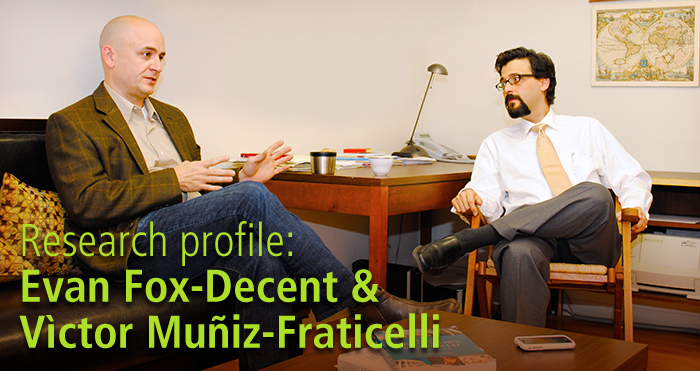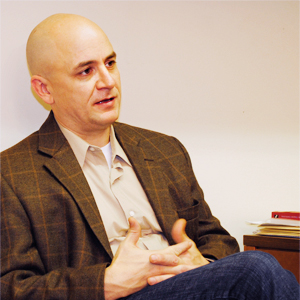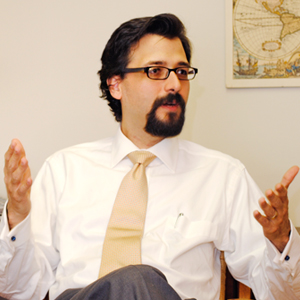
Two assistant professors at the Faculty of Law have carved careers out of interdisciplinary work, combining legal and political theory while working in English, French and Spanish, all with the goal of re-examining conceptions of authority and legitimacy.
One of the intersections on the highways of academia finds jurisprudence meeting political science and philosophy in an intellectual three-way stop. It is here that Evan Fox-Decent and Víctor Muñiz-Fraticelli have hopped on board with their own contributions to all three areas of thought.
Fox-Decent and Muñiz-Fraticelli, both assistant professors at the Faculty of Law, have taken on research that encompasses arguments about indigenous rights, sources of power and the always-heated debate about multiculturalism and accommodation. They spoke to inFocus online reporter Victoria Leenders-Cheng about what happens when the legal theory rubber hits the legal practice road. [Interview has been edited and condensed.]

Evan, you recently co-authored an article that seeks to characterize the relationship between the state and its people as a fiduciary one. What does that mean?
EFD: A common example of a fiduciary relationship in law is that of a parent and a child – at an intuitive level, people believe that parents have the authority to direct and coerce their children in what they reasonably believe to be their children’s interests.
While of course we don’t want to think of citizens as children, I argue that just as parental power gives rise to an obligation owed to children, state power gives rise to an obligation owed to the people subject to the state’s authority. Roughly, states have an analogous duty to abide by the rule of law and govern in a way that allows for every person’s secure and equal freedom.
There’s an additional element to your argument that looks at how fiduciary relationships are based in part on an absence of consent.
EFD: We see in the parent-child and the state-citizen relationship instances where an individual is subject to tremendous unilateral power. Children cannot consent to the relationship they have with their parents. Now, in a liberal democracy states care a great deal about their people’s consent when it comes to determining who will hold public office and the state’s social and economic policies. But this consent or the absence of it, even in a liberal democracy, makes no difference to the state’s assertion of jurisdiction over its people and territory…
Whether you vote or not is really of no importance to the state from the standpoint of the authority it assumes to govern through law. In this sense, citizens, like children, are subject to nonconsensual coercion. This is why the fiduciary relationship is a compelling model for state-subject relations: the fiduciary relation is a kind of relationship in which authority is possible even in the absence of consent. But for this authority to inhere in the state, the state must comply with an overarching fiduciary obligation to govern in accordance with a robust and democratic conception of the rule of law.
Can you provide an example of how this state and citizen fiduciary relationship looks in a court of law?
EFD: The most visible instance in Canada is where the Supreme Court has said that there is a fiduciary relationship between the Crown and some people – our indigenous people… As a result, the Crown must always consult and accommodate indigenous peoples if it’s going to pursue projects that are going to infringe their rights and it must justify these infringements. Many First Nations claim that the Supreme Court has not gone nearly far enough, and arguably under a proper understanding of the fiduciary position of the Crown there would follow recognition of Aboriginal sovereignty. My argument is that the Crown is a fiduciary of indigenous and non-indigenous peoples alike, though First Nations have special claims against the Crown.

Vìctor, your work also deals with questions of legitimacy and authority, but from a very different perspective.
VMF: Yes, Evan is concentrating on how we can change that which we all share [that is, our relationship to the state], while I’m concentrating the implications of that which we don’t share, namely our relationships to all the different associations of which we may be part, such as churches, universities, even cities…
These relationships often divide our commitments and loyalties [in ways…] that may be incompatible. For example, an individual can be a citizen and a member of a church and a member of a family and a student in a university and you can’t say the state is always the superior authority.
You also seem to turn the conundrum around to look at where this authority comes from in the first place.
VMF: [Part of my hypothesis invokes] the theory of legal positivism, which has an interesting overlap with Evan’s fiduciary theory.
One version of legal positivism claims that an authority is justified in its claim to obedience only if it is more likely that, by complying with the authority’s directives, the subject is more likely to comply with the reasons that apply to her in any case. The classic example is the state dictating which side of the road we should drive on. We have a reason to preserve our life and that of others, and we’re more likely to do that if we all agree to drive on whichever side of the road the legal authority tells us to, so we don’t crash into each other.
I take this argument one step further and argue that this positivist theory can be applied to associations other than the state, [such as religious groups, universities, trade unions, and families.] So again, what happens when these associations make competing or conflicting claims? My argument is that when these sources meet, their claims to authority can’t always be ranked, and so instead these associations all have to negotiate and engage in some form of accommodation.
It is hard not to make immediate connections to some of the debates that draw a lot of media attention in Quebec and in Canada.
VMF: In the long conversations over multiculturalism, there has emerged a very useful distinction between recognition and acknowledgment, an idea that a former professor of mine, Patchen Markell, wrote about: I think one of the things we ought to do when considering the relationship between states and associations is not simply grant them minority rights or certain legal rights and bracket them in their boxes but engage them in a conversation that opens up the possibility of negotiation and unsettles some boundaries.
This is not necessarily an idea that will be met with enthusiasm!
EFD: One of the things that is really fun about working at McGill is that here, in a way that is unlike any other institution I’ve worked at, one has exposure to a hunger for intellectual exploration… There’s a real openness to novelty at McGill. This makes McGill an extraordinarily exciting place to test and develop new ideas.
Photographs by Lysanne Larose.
